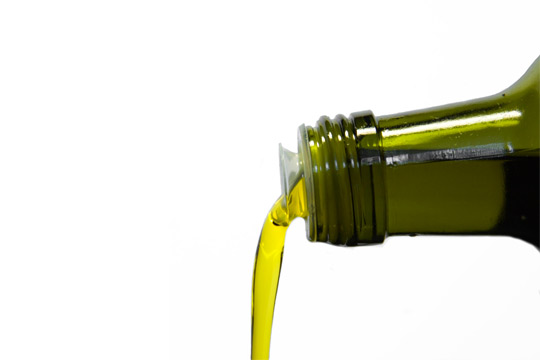
Reducing Food Waste in Foodservice
October 16, 2018 by Doreen Garelick, Dietetic Intern
Our intern Doreen attended a food waste summit for restaurants and compiled these tips to help food service operators redirect…
Nutrition 101, SPE Certified's Perfect Pantry
March 13, 2013

Senior Culinary Nutritionist Natalia Hancock shares her expertise on which fats and oils she keeps on hand, and how to limit saturated fat in oils.
To set the stage for healthier cooking and eating during National Nutrition Month (March), we are making recommendations on foods to add to your pantry, suggesting ingredients to have on hand that will help you effortlessly create healthy meals and snacks at your convenience. In previous posts we've discussed which grains and stocks you should be storing, and this week we’re taking a look at fats and oils.
Fat is a crucial ingredient for cooking. With a few simple tweaks you can stock your pantry with ingredients that are optimized for both health and taste. Swapping unhealthy, saturated fat for heart-healthy fats can help make a serious impact on your diet and health. Moreover, some are best for cooking and others are best for finishing dishes and vinaigrettes.
By checking the breakdown of fatty acids in fats and oils used in cooking, it is easy to control the intake of saturated fat from oils. It’s best to cook with fats that are lower in saturated fat and higher in heart-healthy fats. The USDA recommends that we keep our saturated fat intake to less than 10% of our total calorie intake. Cooking with butter, cream, some palm or coconut oils or -- even worse -- a trans-fatty acid (such as shortening, which should be avoided altogether) can easily put your saturated fat intake over the USDA’s recommendation. Instead, cook with healthy oils or fats, such as olive, organic canola, sesame, peanut, safflower oils or duck/poultry fat.
Oils are susceptible to oxidation and therefore should be stored in a cool, dark place (not over the stove). Oils with higher smoke points are appropriate for cooking, while oils with lower smoke points are better used in dressings or for drizzling.
Cooking oils: olive, canola, peanut, sesame
Cooking fats: duck and chicken (keep refrigerated in a covered container for several weeks)
Drizzling oils: extra virgin olive, argan, nut oils, cold pressed, infused
Which oils do you keep on hand? Let us know your favorite fats to cook with in the comment section below!

October 16, 2018 by Doreen Garelick, Dietetic Intern
Our intern Doreen attended a food waste summit for restaurants and compiled these tips to help food service operators redirect food waste from landfills.
Nutrition 101

Nutrition 101
September 26, 2018 by Doreen Garelick, Dietetic Intern
Ever notice headlines about rapid weightloss? Dietetic Intern Doreen Garelick looks deeper into a recent eye-catching headline to see if there's any truth behind it.
Connect
 Follow us on Twitter
Follow us on Twitter Friend us on Facebook
Friend us on Facebook Follow us on Pinterest
Follow us on Pinterest Follow us on Instagram
Follow us on Instagram Read our Blog
Read our Blog Watch videos on YouTube
Watch videos on YouTube Watch videos on Vimeo
Watch videos on Vimeo Connect with us on Linkedin
Connect with us on Linkedin Find us on Foursquare
Find us on Foursquare
Tweets by @SPEcertifiedBlog Search
Categories
SPE Certified Newsletter
Sign up for news on the latest SPE-certified venues, events and SPE updates.
We will never share your personal information with a third party.